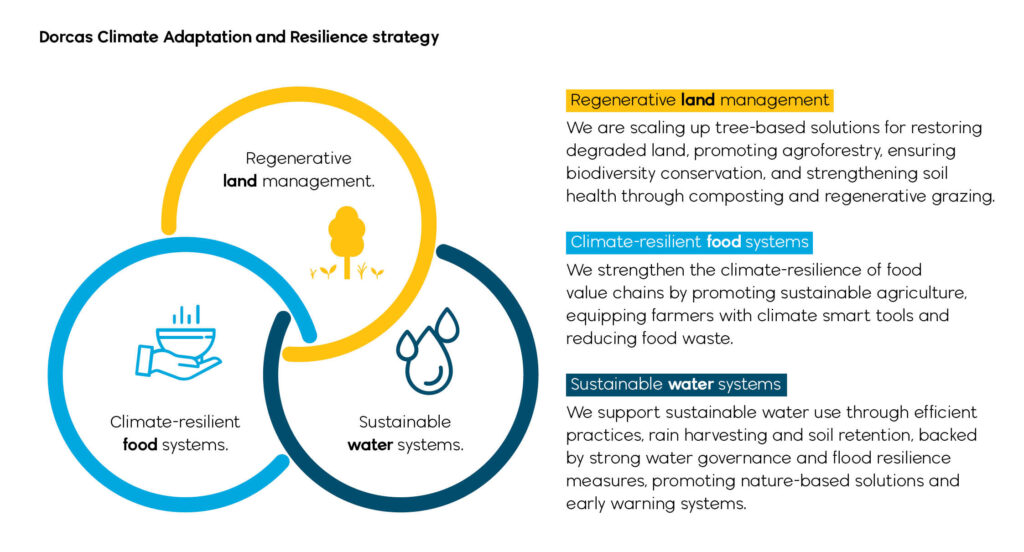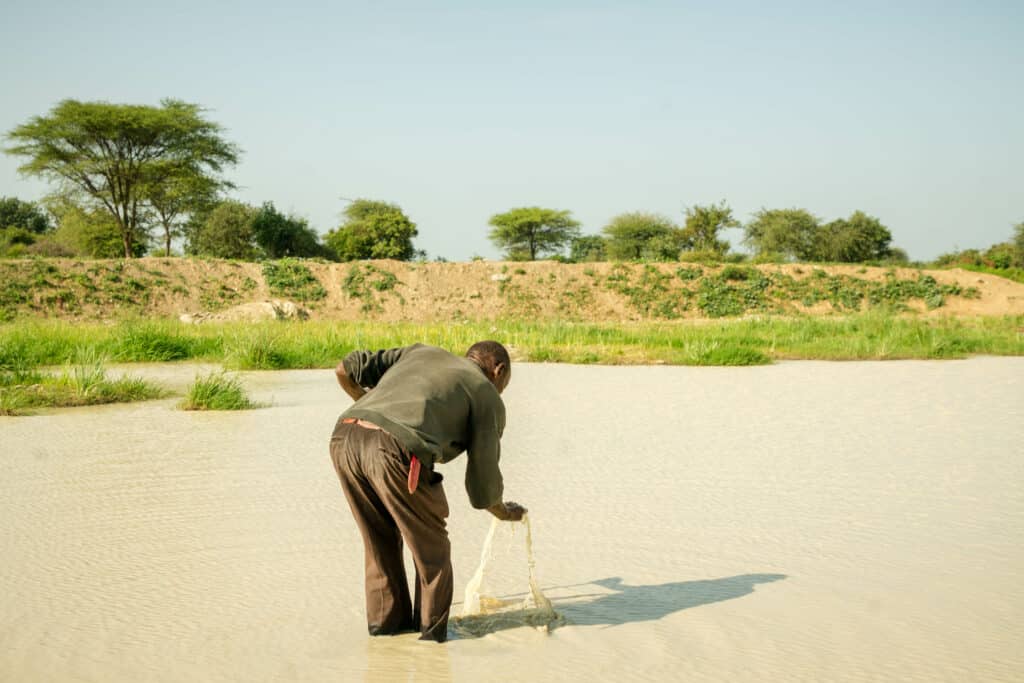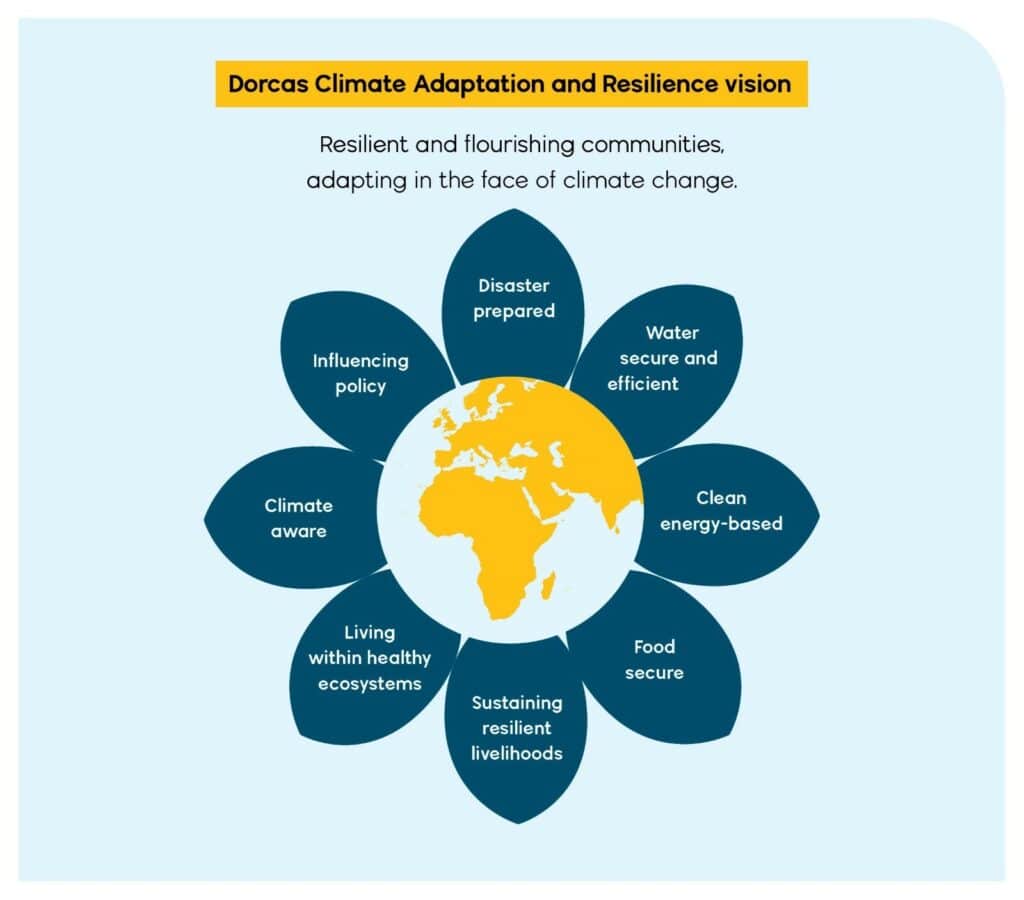Dorcas’s three-pillar strategy for flourishing communities in the face of climate change
The deepening climate crisis is reshaping the way people in many parts of the world live, grow food and manage natural resources. Food systems are becoming more exposed and susceptible to climate shocks. Land degradation and deforestation are accelerating biodiversity loss and reducing agricultural productivity. Meanwhile, water insecurity, droughts and floods continue to threaten sustainable livelihoods.
At Dorcas, supporting communities to adapt to these changing conditions is a key priority. Our efforts focus on three pillars, which are interconnected and form the foundation of our climate adaptation strategy: food, water and land.

In this article we elaborate on these three key areas and how we work to support communities to become more resilient in the face of climate shocks.
Climate-resilient food systems
Our approach begins by addressing the urgent challenge of transforming food production to withstand climate stress. Food systems worldwide are facing immense pressure, and smallholder farmers are particularly at risk as they often lack control over essential resources like seeds, supply chains, and markets.
To tackle these challenges, Dorcas focuses on building farming systems that are both climate-resilient and regenerative. We emphasise practices that restore soil health, enhance biodiversity, and utilise nature-based pest control methods. Farmers receive hands-on training to implement techniques that regenerate soil and improve productivity.
In addition, Dorcas equips farmers with relevant tools, such as access to real-time weather and market data, drought-resistant crops, and precision irrigation systems.
We are also committed to strengthening agricultural value chains to create inclusive and sustainable food systems. By connecting smallholder farmers to local and regional markets, improving supply chains, and promoting better food processing and storage methods, we reduce waste and post-harvest losses while ensuring long-term agricultural resilience.
PIP in Tanzania
One example of our work to support climate-resilient food systems is the PIP project in Chemba, Tanzania. As part of this initiative, two demonstration farms have been set up in the village and a mini dam has been renovated and enlarged to improve rainwater harvesting.
These farms serve as practical learning centres where smallholder farmers can adopt climate-smart practices, such as agroforestry, growing drought-tolerant crops, regenerating soil and using integrated livestock systems. These methods help to mitigate the effects of climate change, including erratic rainfall, prolonged dry spells and soil degradation.
The improved mini-dam increases the community’s capacity to store rainwater, ensuring a more reliable supply for irrigation and livestock during dry periods. ‘At first, we struggled with severe droughts that led to famine,’ says a 75-year-old local farmer. ‘But now, with the availability of this dam, we can continue farming even during the dry season, ensuring sustainable food security all year round.’

Sustainable water systems
Resilient food systems depend on dependable water access, making water security a critical focus. Increasing water shortages, driven by climate change and poor water management, threaten farming and communities, while frequent flooding damages farmland and infrastructure.
At Dorcas, we are committed to ensure sustainable water use for agriculture and communities. We promote efficient techniques such as rainwater harvesting, groundwater replenishment, and soil water retention through methods like contour farming and terracing, supported by stronger water management structures.
We also work to mitigate flooding by enhancing:
- Watershed management.
- Nature-based solutions like wetlands and buffer zones.
- Early warning systems to prepare communities for climate-related disasters.
Supporting bees with a water pan in Kenya
One example of Dorcas’s work to support sustainable water use is in Ngiluni village, Kenya, where we are working through our local partner, the Makindu Rural Development Programme (MRDP). Farmers from the Ngiluni Farmer Field School have received training in hive management and were equipped with 100 modern hives, 1,130 bee-friendly plants, and a water pan. ‘Before the interventions, our hives used to have low colonisation rates and hive abandonment was the norm of the day,’ explains 37-year-old Makau Mutua, a local farmer. The water pan now provides bees with easy access to water, reducing the need to travel long distances and improving colonisation rates. As a result, a bee multiplication centre has been established, and farmers are now planning to start a commercial tree nursery and practise agroforestry to make full use of the rainwater collected.
Regenerative land management
Healthy land is essential for maintaining sustainable food and water systems. Our third focus area is dedicated to restoring and safeguarding landscapes to ensure long-term resilience. Deforestation exacerbates soil erosion and biodiversity loss, while land degradation undermines food production and ecosystem stability.
At Dorcas, we are addressing these challenges through tree-based solutions for climate resilience, which include:
- Restoring degraded land via large-scale tree planting (afforestation) and natural regeneration (reforestation).
- Integrating trees into farming systems through agroforestry practices.
- Encouraging conservation measures to protect biodiversity.
To bolster soil health, we support environmentally friendly methods such as composting and biochar, advocate agroforestry to revitalise soil nutrients, and promote regenerative grazing to prevent land overuse.
Planting trees in the desert with the Waterboxx in Iraq
One example of our work to support regenerative land managment is the Waterboxx initiative in Iraq. Developed by Groasis, this innovative device fosters tree growth with minimal water by collecting rainwater and dew, which is released gradually to preserve soil moisture. This approach is vital for land restoration and food security. Farmer Amin, who cultivates figs, olives, and grapes, reported a 90 per cent reduction in water usage thanks to the Waterboxx, enabling him to recover after years of drought: ‘This is exactly what I needed,’ he remarked.

Flourishing communities
With these efforts, we are committed to supporting communities to become resilient in the face of climate change:

04 June 2025
Are you inspired?
Read the next story or contact us to get to know more about making an impact together.